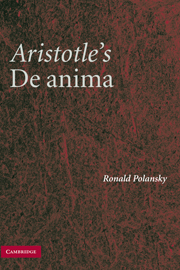Book contents
- Frontmatter
- Contents
- Preface
- List of Abbreviations
- Introduction
- COMMENTARY ON DE ANIMA: : Book 1
- COMMENTARY ON DE ANIMA: Book 2
- COMMENTARY ON DE ANIMA: Book 3
- 1 In the World As It Is There Can Be but the Five Senses
- 2 What Allows for Perceiving That We Perceive; Sense Joins in a Common Power so That the Five Senses Are Subfaculties of a Central Sense Faculty
- 3 Distinguishing Sense and Thought; What Is Phantasia?
- 4 What Is Mind as That Capable of Thinking All Things
- 5 What Enables Thinking to Occur
- 6 The Sorts of Intelligible Objects
- 7 Phantasia Has a Role in All Thinking
- 8 That Mind Can Think All Things
- 9 There Is a Capacity for Progressive Motion
- 10 The Desiderative Capacity Is the Primary Cause of Progressive Motion
- 11 Even the Simplest Animals Have Indefinite Phantasia, and Calculative Phantasia Fits the Account of Progressive Motion
- 12 The Necessary Order of the Faculties of Soul
- 13 The Sort of Body Requisite to Support the Order of the Faculties of Soul
- Bibliography
- Index
11 - Even the Simplest Animals Have Indefinite Phantasia, and Calculative Phantasia Fits the Account of Progressive Motion
Published online by Cambridge University Press: 18 December 2009
- Frontmatter
- Contents
- Preface
- List of Abbreviations
- Introduction
- COMMENTARY ON DE ANIMA: : Book 1
- COMMENTARY ON DE ANIMA: Book 2
- COMMENTARY ON DE ANIMA: Book 3
- 1 In the World As It Is There Can Be but the Five Senses
- 2 What Allows for Perceiving That We Perceive; Sense Joins in a Common Power so That the Five Senses Are Subfaculties of a Central Sense Faculty
- 3 Distinguishing Sense and Thought; What Is Phantasia?
- 4 What Is Mind as That Capable of Thinking All Things
- 5 What Enables Thinking to Occur
- 6 The Sorts of Intelligible Objects
- 7 Phantasia Has a Role in All Thinking
- 8 That Mind Can Think All Things
- 9 There Is a Capacity for Progressive Motion
- 10 The Desiderative Capacity Is the Primary Cause of Progressive Motion
- 11 Even the Simplest Animals Have Indefinite Phantasia, and Calculative Phantasia Fits the Account of Progressive Motion
- 12 The Necessary Order of the Faculties of Soul
- 13 The Sort of Body Requisite to Support the Order of the Faculties of Soul
- Bibliography
- Index
Summary
The desiderative power has been established as that which moves animals. The cognition pertaining to progressive animal motion needs further attention since some animals are extremely simple while others are quite complex. Aristotle has just emphasized that there can be no desiderative power without phantasia and referred to calculative and sensitive phantasia (433b28–30). What if there are animals so simple that they completely lack phantasia, as was suggested in iii 3.428a9–11? What would be the implications for desire and animal motion? And what is calculative phantasia? Does the distinction of sensitive and calculative phantasia call into question the way phantasia was defined in iii 3? Aristotle must confirm that calculative phantasia does not interfere with that earlier account. Moreover, he should show that calculative phantasia fits with the view that desiderative power moves the animal: such phantasia is not moving the animal without involvement of desire.
What is it that moves the incomplete animals (τῶν ἀτελῶν), where by “incomplete” is meant lacking the full range of senses (433b31–434a2)? The animals under consideration have merely the contact senses, touch and taste (ἁφή in 434a1 may apply to both), but none of the distance senses that complete the possible sensitive component of animals. Such animals without distance senses, it will be seen in 434b24–27, do not have progressive motion. Might these animals also lack phantasia, and if so can they have appetite?
- Type
- Chapter
- Information
- Aristotle's De AnimaA Critical Commentary, pp. 527 - 533Publisher: Cambridge University PressPrint publication year: 2007



